IBS Held the 20th International Scientific Conference “SMART FUTURE: Artificial Intelligence in Education, Economy, Business, and Governance”
The International Business School (IBS) successfully held its 20th International Scientific Conference, dedicated to one of the most critical challenges and opportunities of our time—Artificial Intelligence (AI). Under the theme “SMART FUTURE: Artificial Intelligence in Education, Economy, Business, and Governance,” the conference brought together scholars, experts, institutional representatives, and young researchers from Bulgaria and abroad. The event became a key platform for exchanging knowledge and ideas on the impact and potential of AI across various sectors of public and economic life.
The conference was officially opened by Assoc. Prof. Dr. Stella Baltova, Vice-Rector of IBS, who welcomed the participants with remarks on the importance of inter-institutional dialogue and the role of higher education in addressing the challenges posed by AI.
“AI is rapidly entering all areas of socio-economic life across the globe, possessing the potential to address complex challenges related to improving education, fostering research and innovation, healthcare, climate, the financial sector, creative industries, and more. It is estimated that at least 70% of companies will adopt and use some aspects of AI technology by 2030.
The European Commission has launched a consultation for a future AI strategy in science, aiming to accelerate the responsible use of AI in research and to facilitate scientists’ access to specialized tools, computational infrastructure, and funding,” said Assoc. Prof. Dr. Stella Baltova, Vice-Rector of IBS.
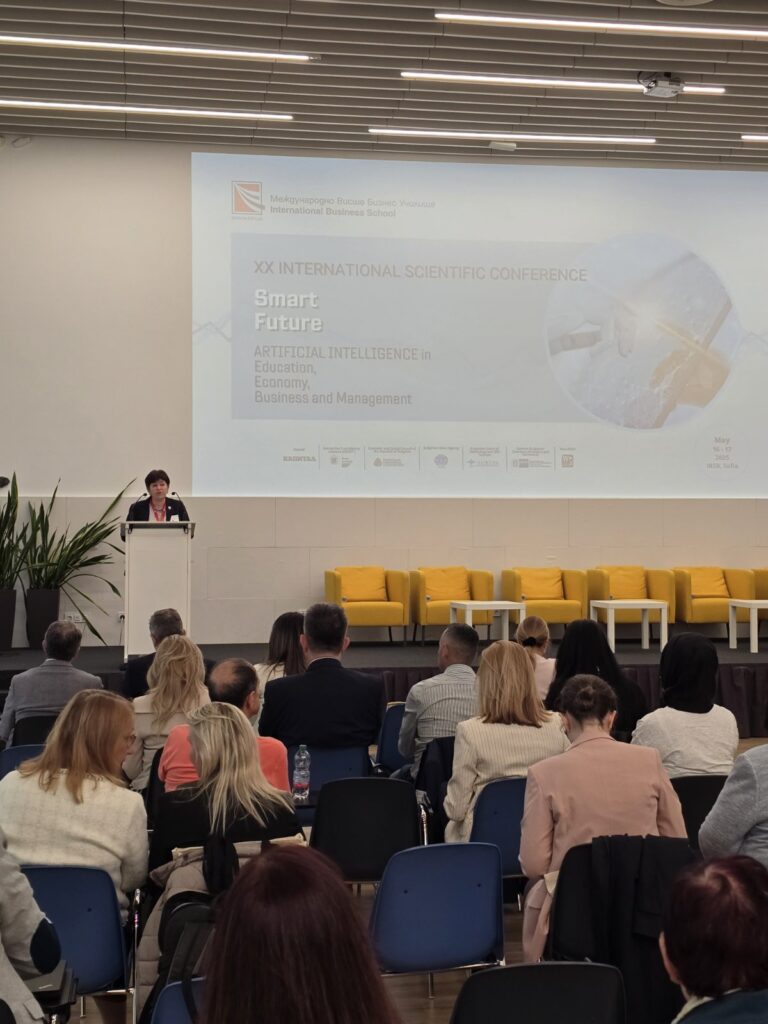
“Our goal is to transform this forum into a platform for scholars in the fields of social sciences, natural sciences, humanities, and industry to communicate with each other, share their latest achievements and research findings related to AI and its applications, and to discuss market positioning and management in building a smart future grounded in AI implementation—in the context of education, economy, business, and governance.
It is also an opportunity to debate innovative models, practical challenges, and potential solutions in these strategic areas, which are essential for the socio-economic development of Bulgaria, the European Union, and the world at large,” added Assoc. Prof. Dr. Stella Baltova.
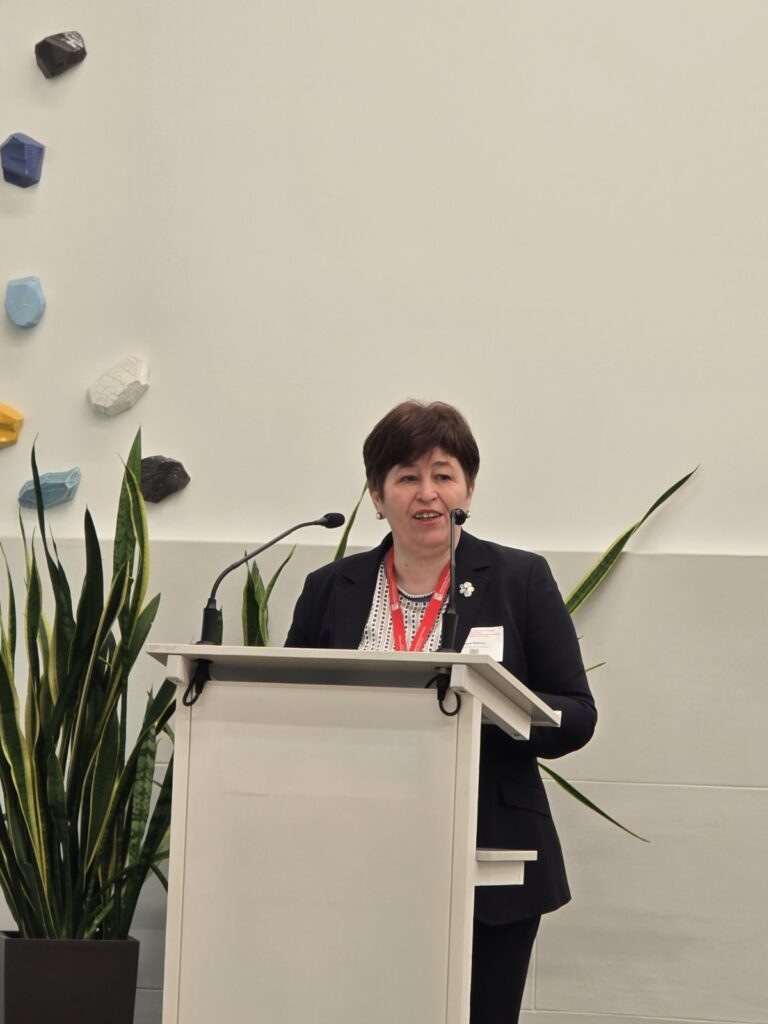
On behalf of the academic team and the President of IBS, Mrs. Lena Gaydarska, a welcome address to the participants was delivered by Prof. Dr. Georgi Apostolov, Rector of the International Business School.
*”In just a few years, we’ve witnessed how a phenomenon that, less than a decade ago, seemed entirely within the realm of science fiction is now dictating the pace of our everyday lives. AI is no longer ‘the new’—it is the present, transforming our language, our thinking, our work, and, indeed, our lives and expectations for the future.
What does this mean for us—as human beings, as scholars, as educators, as creators of meaning—in a society that is increasingly, even frantically, searching for direction? The theme of our scientific conference, defined long before today’s events, shows the sensitivity and foresight with which we have turned toward what is perhaps the deepest and most critical debate of our time.
This is not just about technology—it is about a new form of human existence. An existence in collaboration with a machine of generated intelligence. AI is entering education not only as an assistant but also as a challenge,” said Prof. Dr. Georgi Apostolov.
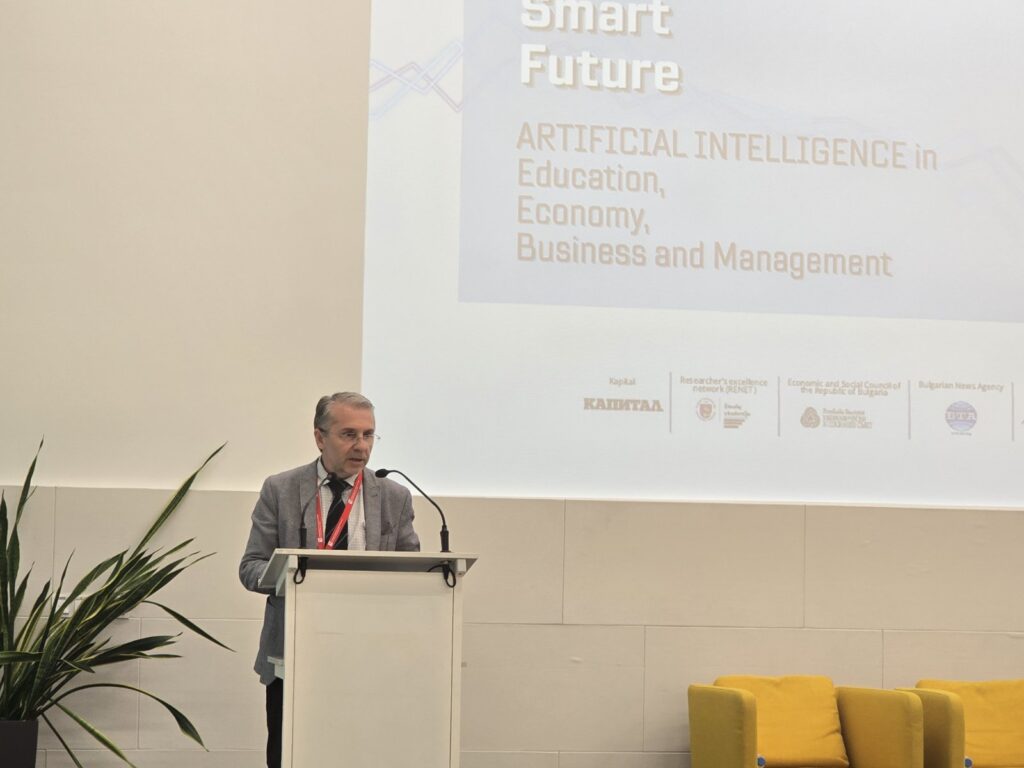
He continued with a metaphor: “Artificial intelligence is, if you will, our new Prometheus—granting us fire that can illuminate new paths and inspire creation, or ignite flames of deception, soullessness, and conformity; bringing light that brightens our future, or fire that could burn down our home.
In business, it can unlock incredible efficiencies, but also erode the value of labor. In governance, it can shape smarter decisions, but also exclude humanity from the decision-making process. In the economy, it can level opportunities—or concentrate them even further into the hands of the few.”
“But let us not focus solely on the risks and threats, and let us not forget that even the most powerful technologies do not determine the direction of progress—the direction is shaped by human vision and values. Artificial intelligence has no goals—we set them. Artificial intelligence has no virtues—we are their bearers. In this sense, the greatest challenge is not what AI will do to us, but what we will do with ourselves thanks to it,” concluded Prof. Dr. Georgi Apostolov.
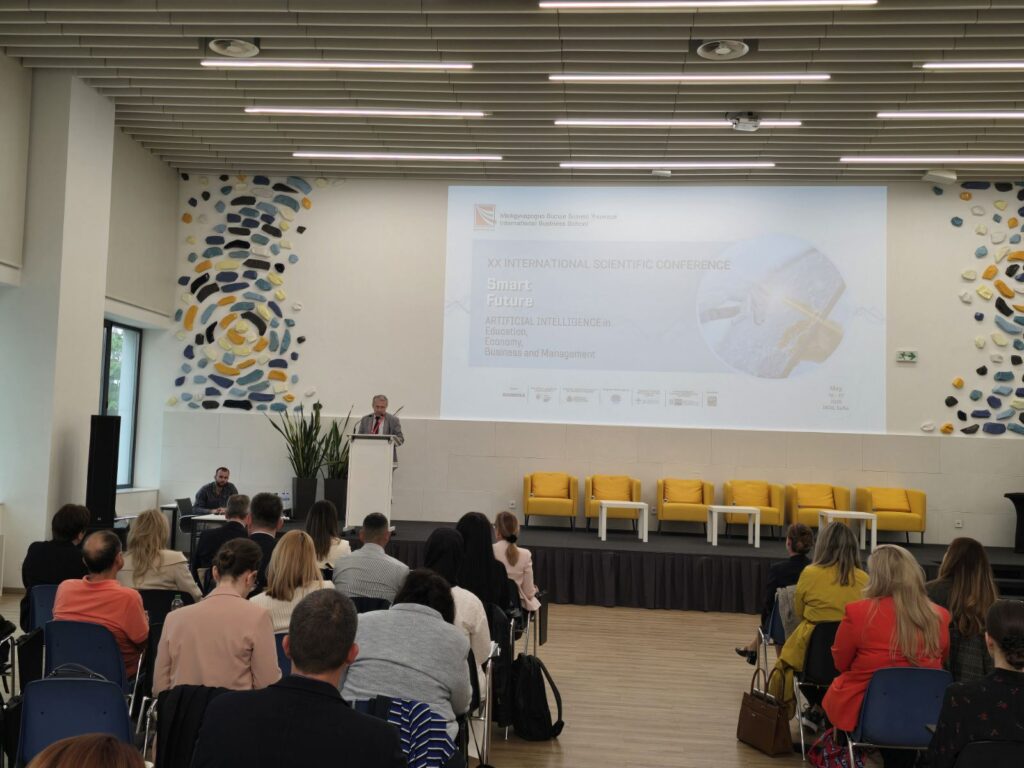
The event was honored with congratulatory addresses from key figures in the academic and professional community:
- Prof. Dr. Milen Baltov, Rector of Burgas Free University
- Assoc. Prof. Dr. Daniela Georgieva, representative of the international scientific network WoodEMA
- Dr. Siika Katsarova, Chairperson of the Board of the Bulgarian Union of Balneology and SPA Tourism (BUBSPA)

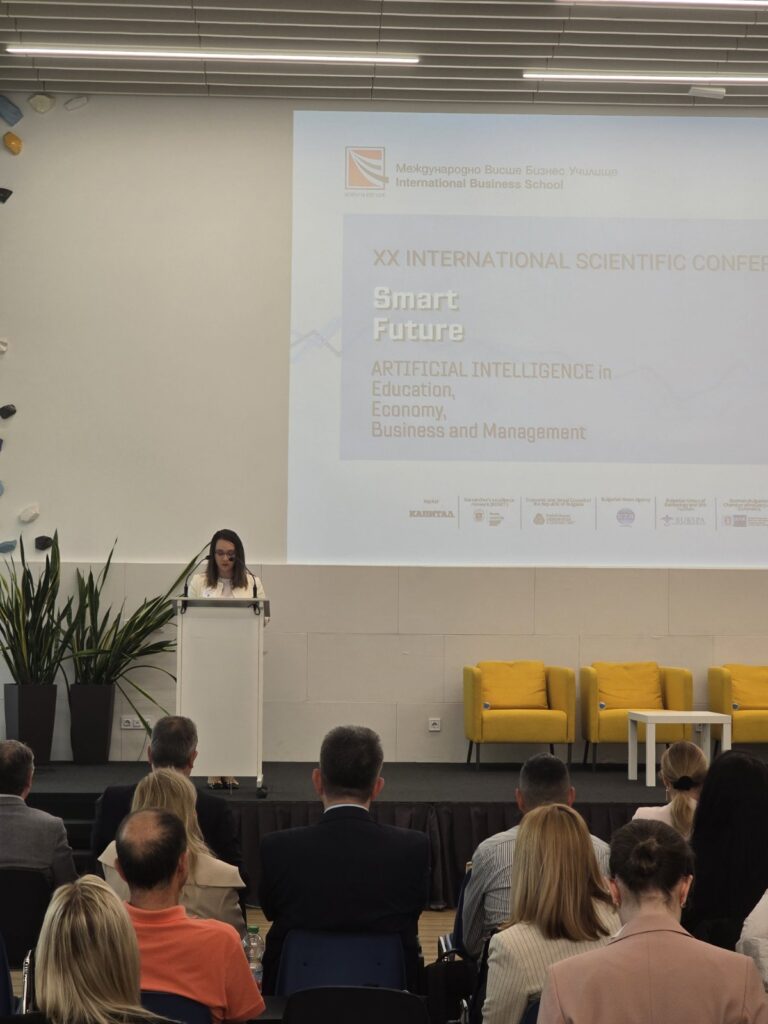
Among the key highlights of the conference was the plenary report delivered by Zornitsa Russinova, Chairperson of the Economic and Social Council of the Republic of Bulgaria, titled:
“Expected Effects of Artificial Intelligence on the Labor Market in Bulgaria: Measures to Address the Challenges of Current Policies”.
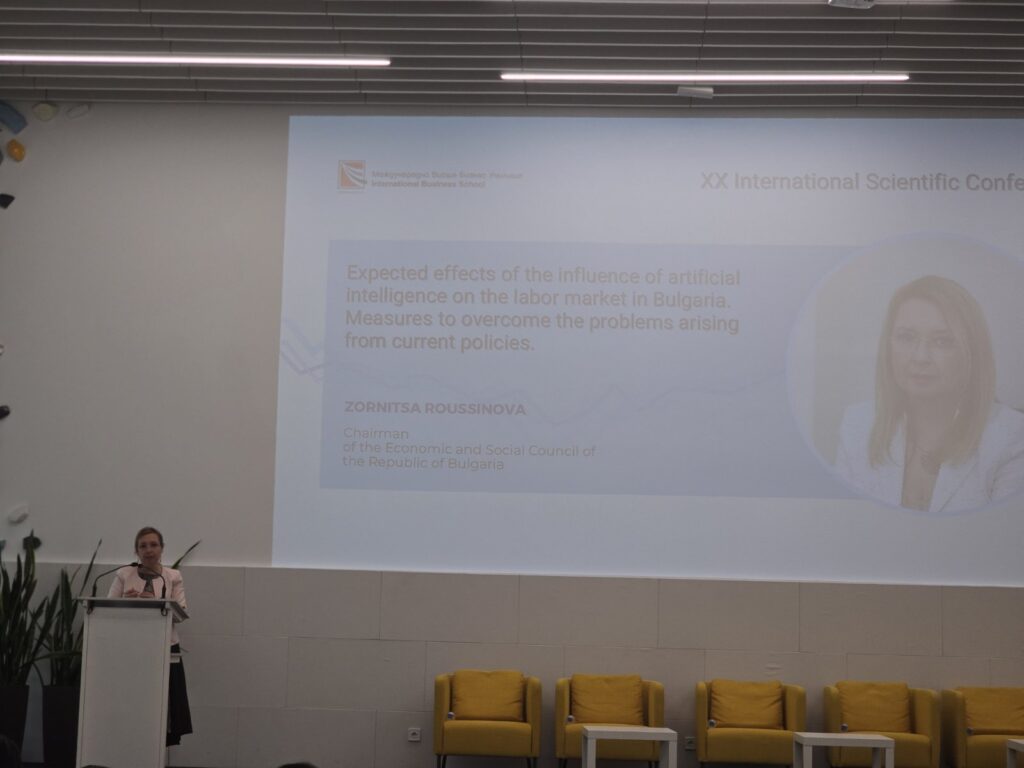
In her address at the conference, Zornitsa Rusinova emphasized the importance of the scientific debate on artificial intelligence not only for the academic community, but also for business and government institutions. She expressed confidence that the event would contribute to shaping a clearer vision for integrating AI into all areas of life.
According to her, Bulgaria ranks 8th among Eastern European countries in terms of the number of scientific publications in the field of AI, with over 3,000 documents—an achievement that demonstrates potential, but also highlights the need to further stimulate research and innovation. Rusinova stressed that conferences like this one have the potential to strengthen Bulgaria’s contribution at both the European and global levels.
She also presented key data from studies by the Economic and Social Council, indicating that around 60% of employers are already using AI, and over 40% of individuals apply it in their daily lives—primarily in high-tech sectors. Around 30% of professions now incorporate AI into their everyday practices.
“To mitigate the risks of job displacement, policies must prioritize the reskilling of workers affected by automation. Businesses need to be encouraged to invest in employee training to prepare the workforce for the changing nature of work. These are just some of the recommendations made by employers, trade unions, and civil society organizations in the Council’s adopted analysis,” Rusinova stated.
Despite widespread concerns about job losses, Rusinova emphasized that the fear of automation is largely exaggerated:
“The speculation that people will lose their jobs because of AI is a myth. In fact, it’s quite the opposite—technological advancement will give a new boost to the economy and create new employment opportunities.”
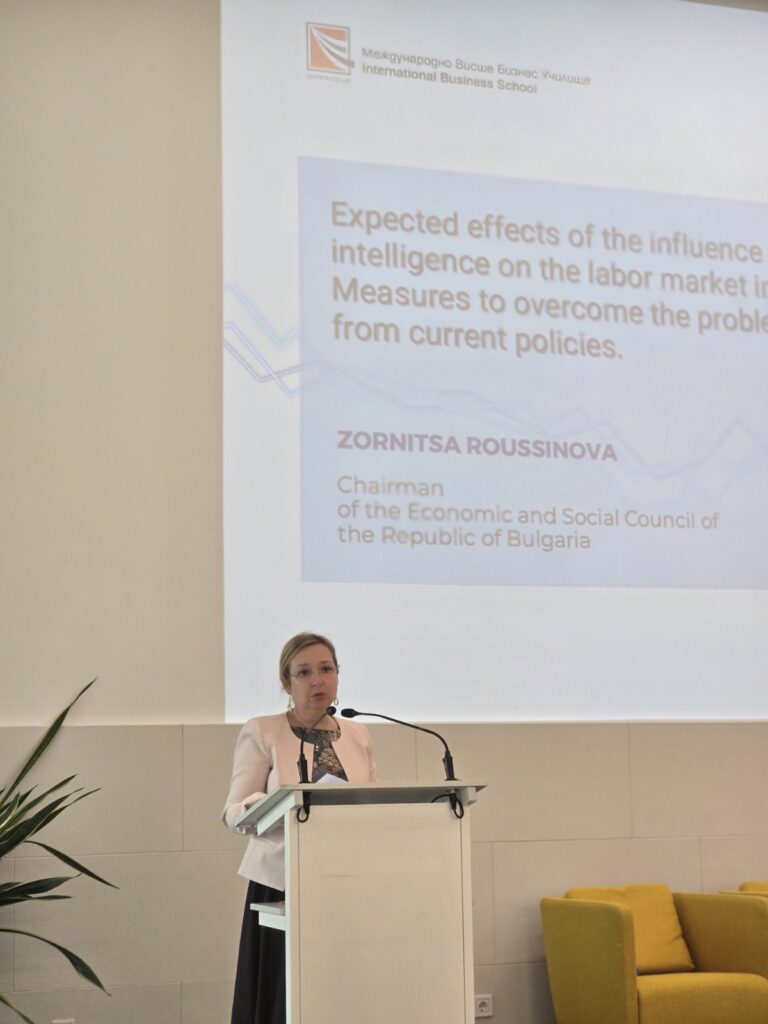
Following the report by Zornitsa Rusinova, Chairperson of the Economic and Social Council of the Republic of Bulgaria, the conference continued with a discussion panel titled:
“AI Policies – National and European Dimensions, and Their Impact on Research and Education.”
The panel was moderated by Prof. Dr. Tsvetan Iliev from the IBS academic team.
The discussion featured leading experts and representatives from institutions and the business sector, including:
– Dr. Yordanka Chobanova – Head of the Representation of the European Commission in Bulgaria
– Elitsa Stoilova – Founder and CEO of Umni.bg
– Dobroslav Dimitrov – Chair of the Management Board of the Bulgarian Employer Association for Innovative Technologies (BRAIT)
– Radoslav Simionov – Entrepreneur and PhD student at Burgas Free University
– Prof. Dr. Irina Tsakova – from the International Business School (IBS).
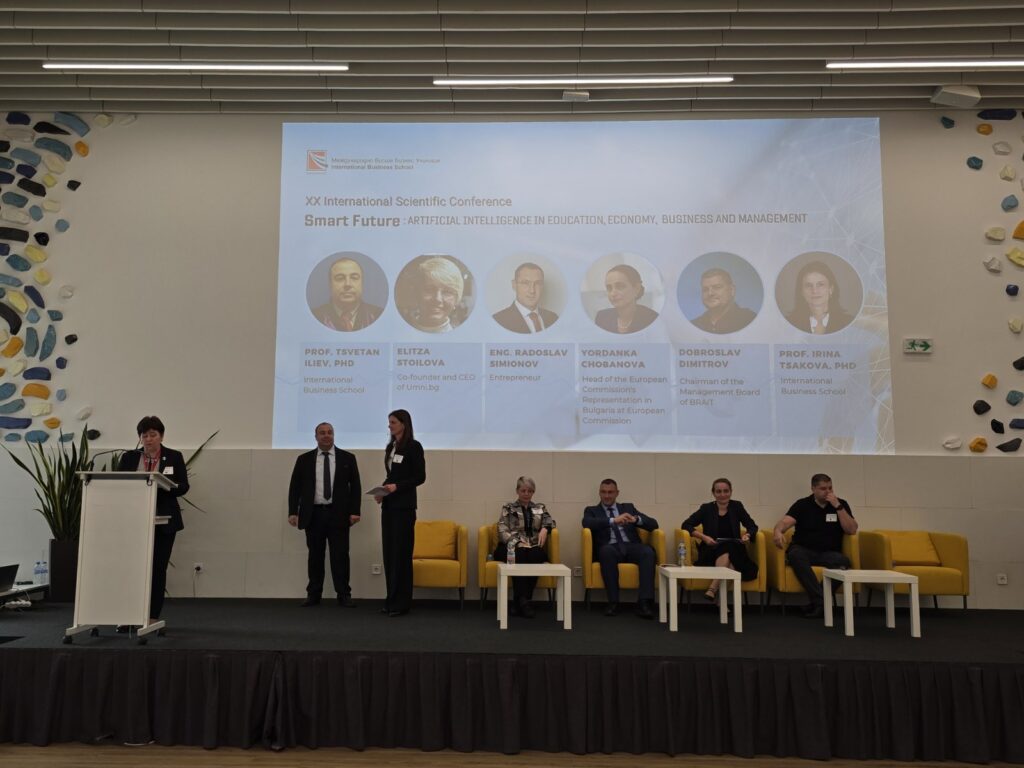
The panel discussion during the conference focused on the practical dimensions of implementing artificial intelligence and highlighted the need for close collaboration between education, business, and institutions. A central emphasis was placed on building an ethical, sustainable, and strategic approach to emerging technologies in the context of their growing impact on society.
The discussion addressed both the opportunities AI offers—such as automation, increased efficiency, and access to new levels of analysis and service—and the risks associated with public distrust, lack of regulation, insufficient transparency, and the potential for social inequality. The panel stressed the urgency of developing ethical standards, a suitable legal framework, and timely responses to the challenges AI poses for individuals, businesses, and the public sector.
A major point of attention was the concept of AI literacy as a critical component of modern functional literacy. The lack of AI-related knowledge and skills among young people was identified as a serious barrier to their future professional development, while the education system was described as lagging behind the realities of the labor market and technological advancement.
The topic of intelligent technologies in buildings and urban environments was also explored. Participants highlighted the benefits of implementing IoT solutions, including improved energy efficiency, resource management, and quality of life in urban areas.
In terms of business, the panel emphasized that the shift toward high technology requires not only investment in tools but also in people—through building digital competencies, fostering internal cultural change, and engaging in innovation ecosystems. The transformation was described as a continuous process, in which sustainability, security, and ethics must go hand in hand with digitalization.
Finally, the discussion touched on the possibility of legal regulation of AI. It was emphasized that the legal system must adapt to the new technological reality by offering balanced, effective, and flexible solutions that protect fundamental rights, ensure transparency and trust, and at the same time do not hinder innovation.
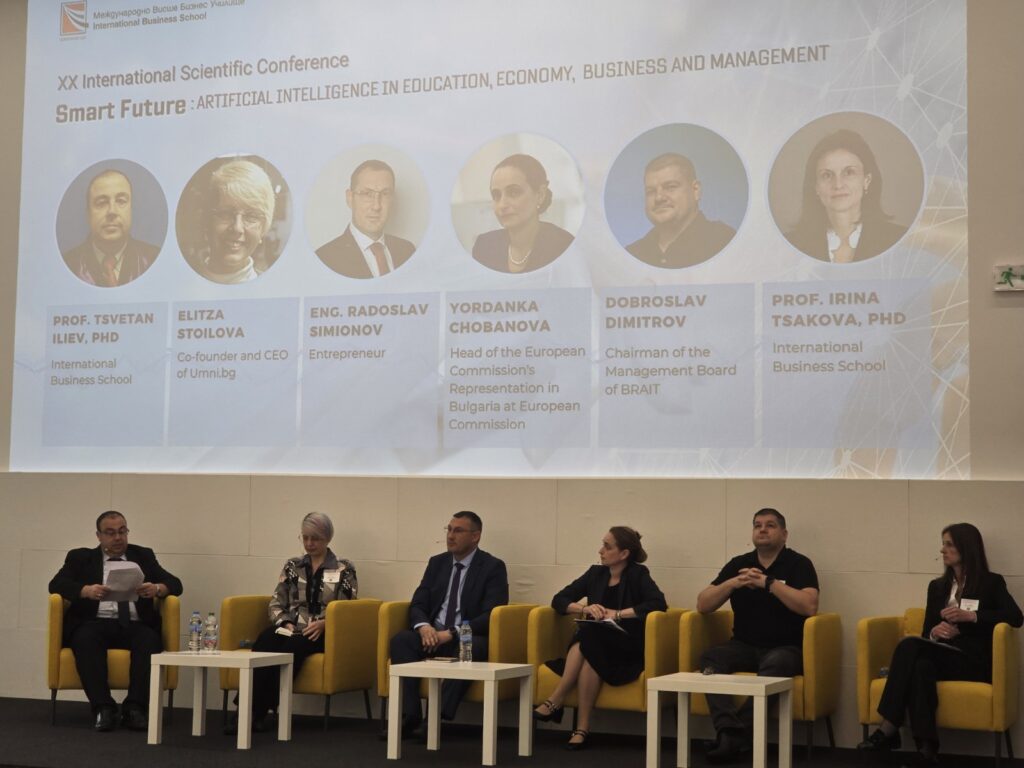
The event continued with the presentation of scientific papers and discussions involving over 90 scholars and business representatives from Bulgaria and abroad, across five key thematic areas, reflecting the broad impact of AI on society:
- Educationa and Artificial Intelligence
Focus on the need for transformation in teaching processes, curricula, and the skills of future professionals in the context of AI.
- Economic Aspects of AI
Discussion on the effects of AI on productivity, the labor market, income, and the need for regulation and trust in the digital economy.
- AI and the strategic choices facing businesses.
Exploration of AI as a tool for optimizing management, marketing, and the digital infrastructure of modern enterprises.
- AI in Organizational Development and Human Resources
Focus on the impact of AI on employees, business psychology, ethics, and the need for strategies for positive transformation.
- Forum for Students, Doctoral Candidates, and Young Researchers
A platform for young researchers to present their scientific achievements and ideas aimed at a smart future.
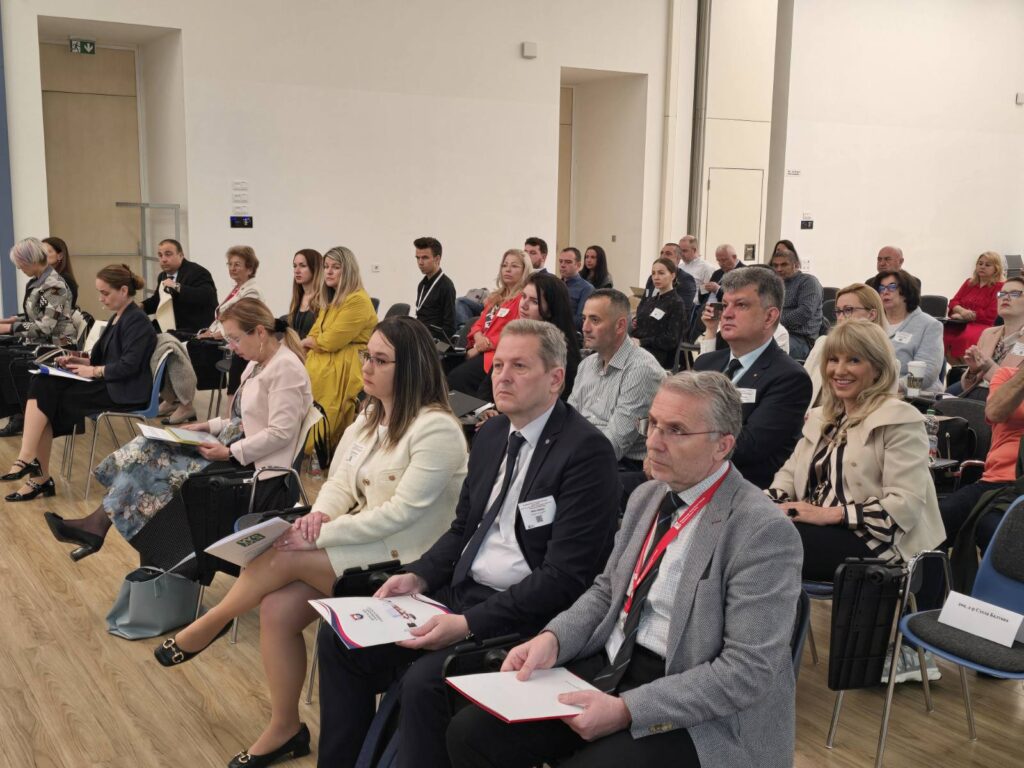
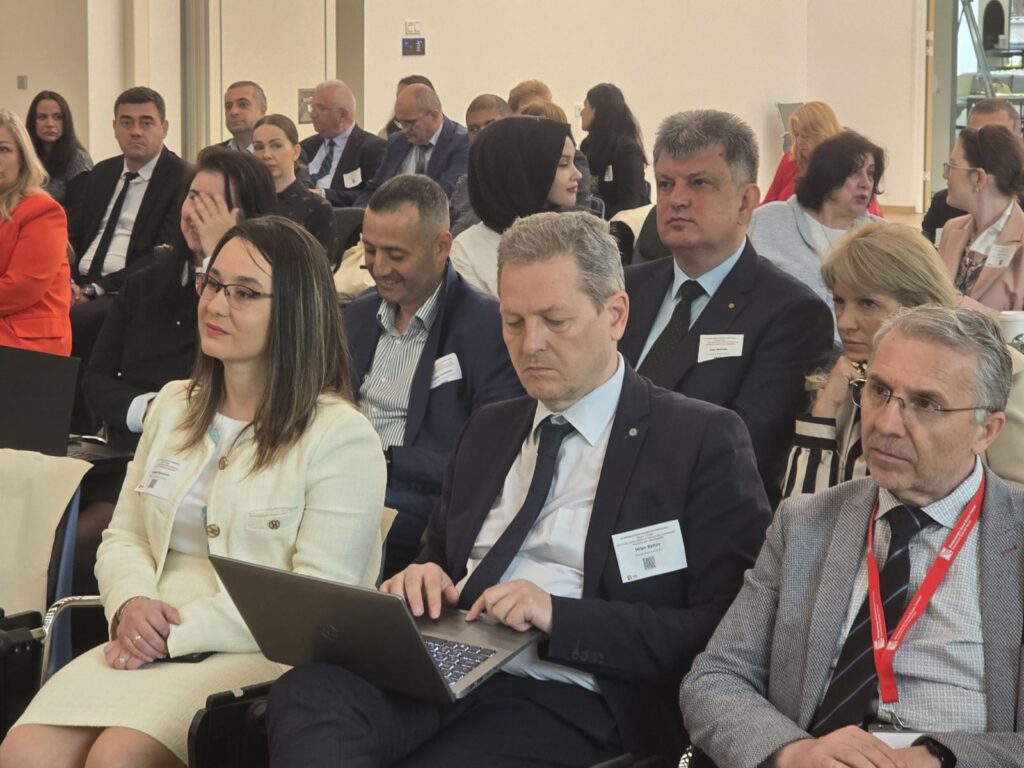
The conference concluded with a commitment to continued dialogue and collaboration in the field of artificial intelligence. In the spirit of openness and innovation, IBS reaffirmed its role as a space for generating ideas, solutions, and sustainable development in the digital age.

